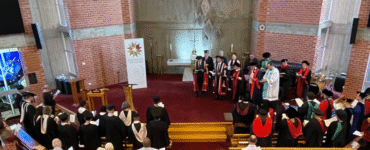The following address was given by Dr Graeme Blackman AO FTSE FAICD, Chancellor of the University of Divinity and Chairman of Leading Age Services Australia, to launch the new publication “Kingdom Communities: Shining the Light of Christ through Faith, Hope and Love”, by Andrew Menzies and Dean Phelan. The launch was held on Tuesday 4 December 2018 at Stirling Theological College.
Over the past twenty-five years, I have been privileged to have served on a number of governing bodies associated with the Anglican Church in Melbourne. These include: Archbishop in Council, which is responsible for all temporal matters relating to the administration and management of the Diocese of Melbourne; Director on the Board of Benetas, the large Anglican Aged Care Services Provider in Victoria; Chairman of Anglicare Victoria, one of the largest providers of Child and Family welfare services in Victoria; Deputy Chairman of Melbourne Grammar School, one of the state’s most highly regarded church-based schools; and member of the Board of Trinity College, an Anglican College of the University of Melbourne. I am also currently a director on the Board of the Melbourne Anglican Diocesan Corporation, a corporate entity established by the synod of the Anglican Diocese of Melbourne to be the employer of clergy and lay people in the diocese of Melbourne and to handle redress matters flowing from the Royal Commission into Institutional Abuse.
These institutions deliver truly extraordinary positive outcomes to the individuals with whom they engage, whether it is through worship, pastoral care, education, welfare services, aged care services or any of a myriad of support activities. Most of these organisations had their origins in good works started at some time in the distant past by extraordinary persons and often linked into local neighbourhood initiatives focussed on local parishes. Many of these organisations, and others, still have linkages to their historic roots, but from a governance perspective, history shows that all these particular organisations were formally spun away from the founding entities, whether parish or diocese, to be set up under their own constitutions with only the vaguest connection with the founding enterprises. The driving force for these devolutions was frequently an anxious desire by the founding enterprise to lay off risk into an independent not for profit entity and move the spotlight of liability away from the church. The connections to the church in many of these extremely worthy organisations, are now distant and generally represented loosely by provisions in their constitutions that require the Archbishop or the Archbishop in Council to approve a small number of director appointments, often less than a majority of the Board. Diocesan Auditors have for years considered these entities not to be related parties for the technical purposes of constructing statutory accounts, so that the relationship between the church as represented by its diocesan, hierarchical structure and these entities, may be rather tenuous.
A constant source of concern for me throughout my time on these Anglican governing bodies is the lack of a cohesive and clear single governance regime that enables the church to implement a clear mission-based agenda for these excellent but diverse organisations.
Like many Anglicans, I have been much challenged by writers like the Anglican Missiologist Lesslie Newbigin, who is a source for Andrew and Dean, and who reminds us about the fundamental missional nature of the Church. I will quote briefly from Chapters 17 and 18 of Newbigin’s The Gospel in a Pluralist Society:
The Church is nothing other than that movement launched into public life of the world by its sovereign Lord to continue that which he came to do until it is finished in his return in glory [Chapter 17].
And further in the next chapter:
The Church is sent into the world to continue that which he (Jesus) came to do, in the power of the same Spirit, reconciling people to God [Chapter 18].
And then along comes this excellent book by Dean and Andrew which delivers a range of solutions based on sound biblical, theological, philosophical, pastoral and practical experiences in addressing the challenge of silos in the church, such as in the model I have just described.
“Kingdom Communities: Shining the Light of Christ through Faith, Hope and Love.” In Paul’s first letter to the Corinthians, we read his famous hymn of love in Chapter 13, finishing with the words used by Andrew and Dean to frame the text of their splendid book. How else, we might ask, would we “Shine the Light of Christ” other than through Faith, Hope and Love, three profoundly mission-drenched descriptors of the life we expect to live in Christ. How appropriate that Andrew and Dean have, with a stimulating combination of theological scholarship and grounded pastoral experience presented to us a handbook for living the Christian life within the context of so-called “Kingdom Communities.”
The authors have presented for us a timely apologia for the creation, nurturing and celebration of these Kingdom Communities, and provided us with a roadmap, or as the text describes it, a blueprint (p54), for a new way to be and do church, but one that at the same time recognises and affirms the validity and role of our traditional ministry expressions around parish communities.
Andrew and Dean provide compelling, and well known, data to illustrate the demise of traditional religious expressions. The blunt instrument of the Australian Census shows a catastrophic spiral of church attendance over the past few decades, which has been accelerating dramatically in the last few years. Similar demise is reported internationally. The consistent proposition argued by Andrew and Dean is that a major contributor to this demise is the inertia of mainstream churches with their incapacity to respond effectively to rapidly changing social circumstances and the consequent radically changing societal demands to which the churches have a missional responsibility to respond to. The churches and their structures are largely unchanged from those that applied at their formation as entities. For decades, centuries and even millennia, these structures have served as effective structures for delivery of the imperatives of the Gospel. But now is the time for change. As Andrew and Dean observe in commenting on churches planning to be “the last in their generation (p36)”:
These churches seem unable to move on from constraints of clericalism, denominationalism and creeds, in order to participate with freedom and vitality where the Spirit now appears to be leading. (p36)
The life of the early church had many of the characteristics of the proposed Kingdom Communities model that they describe in this account. However, as the church became formalised and hierarchical, the community-based model of being church and delivering on its gospel mission transitioned away, and basically remained distant from, the community-based model of the early church. As a dramatic and fundamentally limiting consequence of this historic transition, the inherited structural models have resulted frequently in a separation of ecclesial and care agencies, a preference for denominational entities to look to the preservation of their historic structures rather than to seek spirit-driven partnerships, an assumption that there is a clear divide between areas of social concern on the one hand and church health on the other with little or no recognition of the mission objectives of one side of this divide by the other, a drift towards the service delivery side away from the traditional expressions of liturgy and worship and the reality that theological educators and researchers have not kept up with the changing dynamics of church expression.
At the same time, training in care vocations is increasingly provided by secular training institutions and universities, leading inevitably to a loss of a faith dimension to care.
There are of course many exceptions to this model of a divided expression of church and Andrew and Dean point some out. From my own current experience in the Aged Care sector, I welcome for example the initiatives of Meaningful Ageing Australia who are bringing to the attention of the Aged Care industry the critical importance of Spiritual Care, informed by but not limited to the rich tradition of spirituality within Christian denominations. I was delighted to read in Andrew and Dean’s book about the success of the Churches of Christ in the inaugural Meaningful Ageing awards in 2015 (p206).
We observe that Australian culture seems to have by and large moved away from the ‘village-congregational’ model of church, that clergy stress is increasing, that clergy vocations in some denominations are falling, and that the only churches that are thriving seem to be corporate-entertainment models which typically grow from transfers from other churches and build little sense of formational and relational community. Increasingly denominational growth is driven principally by migration.
But as societies change, needs change with them, and the structures that grew up as the churches evolved may no longer be appropriate for the community today. In the words of the authors:
the Kingdom of God must come first, not the comfort of the Church (p42).
Andrew and Dean point for example to the radical interventions proposed by liberation theologian Leonardo Boff through his promotion of Base Ecclesial Communities as a means to respond to desperate poverty where the traditional mission of the church was simply absent. As the missiologist Alan Roxburgh observes in his Forward to the book, Boff’s work provides:
a critical discussion about the ways of being God’s people in a time of unravelling; of being a people who are able to discern the bubbling and ferment of the Spirit out of the usual “church” forms and in the communities that are all around us.” [p 12]
Boff’s response and theological proposition was timely and appropriate for his particular circumstances in Brazil of thirty years ago but as Andrew and Dean remind us, this response has much to teach us about new ways of expressing church today when the traditional structures fail. To use their language, Boff’s communities are Kingdom Communities, formed to enable support and witness when the mission of traditional church structures failed societies. For Andrew and Dean, Boff’s Base Ecclesial Communities are:
an expression of the Kingdom with a particular purpose of renewal through concern and empowerment of local people and communities, especially the poor. (p109)
As I read this book, I was struck not just by the passion and competence of the authors in their clear enunciation of a new way forward for the church, but by their pragmatic and practical approach to models of implementation.
In the first four chapters, the authors set out a theoretical framework for their vision of the new approach to church structure and life.
In Chapter 3, we read about their challenge to the traditional centralised hub and spoke model of church with a challenge to replace this with a distributed network of communities which ‘shine the Light of Christ through Faith, Hope and Love”. But when we consider the explicit challenges posed by a full embracing of a networked model of ekklesia, Dean and Andrew wisely qualify the model by recognising in Chapter 7 the reality of a need for appropriate governing structures which can apply to the evolving Kingdom Communities. They do not want us to “throw out the baby with the bathwater (p225).” Explicitly they observe:
We live in a society that expects higher standards of leadership and governance in community settings, particularly from religious bodies. Therefore, some Kingdom Communities may freely want to drift off on their own to pursue their own vision but that is not what we envisage as the gold standard. Across Churches of Christ in Queensland, as the Kingdom Communities grew, there were clear lines of accountability, minimum standards, alignment, leadership qualification and branding (to name a few key areas. (p225)
In an age informed by the findings of the Royal Commission into Sexual Abuse, the churches are compelled to create and work within a safe environment and Andrew and Dean’s model acknowledges this imperative.
This book invites us to reconsider not just the way our denominations deliver their services and empower their congregations to engage in a new spirit-filled missional life through the creation of Kingdom Communities, but it will require us to rethink the way we prepare individuals for new models of church and service. Here is a challenge for our seminaries and theological schools. I do not think we can assume that traditional models of clergy preparation will be sufficient for delivery of radical new distributed networks as a model of church life. We will need to wrestle with new theological precepts, social justice imperatives and the role of churches in intimate engagement in welfare, aged care and other denominational based care services. Andrew and Dean comment:
There is a large and necessary theological and ministry task at hand, which must be in partnership with those at the coalface. God’s people need avenues of growth towards intellectual and spiritual maturity that equips them for engagement with modern culture, with a level of professional tertiary rigour that matches with their gifts and skills. (p84)
So we have something of a paradox here.
On the one hand, we argue that historic church structures have given rise to silos which have spun out of the traditional church structures and which operate as stand-alone entities. These entities often have a vibrant life of their own: welfare agencies, aged care facilities, schools and other educational enterprises, health care agencies, hospitals. However, these entities often do not share explicitly in the missional challenge and vision of the churches with which they are associated, nor do they see such missional activity as central to their own activities. We are surprised, but perhaps not so surprised, when we read in Andrew and Dean’s book stories about parish churches and care agencies operating in close proximity to each other but unaware of their common denominational affiliations (p 173, 182).
On the other hand, however, we are invited to advocate for the formation of Kingdom Communities which whilst expressing a life of faith in their own context, do so in unstructured and inspirational ways.
Andrew and Dean resolve the paradox with a both/and solution: theirs is a model that affirms denominational structures when they are freed to vision a new life of the Spirit so that they can in turn be effective catalysts, implementers and enablers for the creation, encouragement and resourcing of Kingdom Communities:
The experience in Churches of Christ Queensland was that the greater the investment in Kingdom Communities, the greater the growth of the traditional churches as well. (p119).
In this important book, Andrew and Dean have sought to create a unifying term (Kingdom Community) and an accompanying theological framework in response to a hope-filled trend and future where ministry, theological, executive and care experience are brought together in a spirit-filled ambitious agenda for the life of the Church. They have exemplified this by the story of the Churches of Christ in Queensland. And we hear similar stories emerging in other states and denominations. Kingdom Communities is an outstanding resource for individuals and faith-based entities to develop a new way of bringing the light of Christ into the communities they serve.
There are of course challenges in this radical model, but the Christian Churches have never been without challenges and Andrew and Dean’s book will give hope and inspiration for those who choose to pursue a new way of being church in the world, one that acknowledges historical denominational structures but which at the same time invites us to explore together new paths of mission through the exploration of Kingdom Communities.
At a time when market forces, a favoured term of many modern politicians and economists, seem to be driving increasing polarisation in our society as the weak are further weakened and the strong are further strengthened, as safety nets evaporate, as places of safety for marginalised or disadvantaged individuals and communities are defunded and disestablished, and as the traditional influence of churches on societal well-being and good behaviour diminishes, there has never been a more critical time for a radical re-evaluation of the missional responsibilities of our churches. The challenge is to entertain a major paradigm shift for our denominations.
Andrew and Dean’s book gives us a response to this challenge, through new life in our denominational schools, our aged care services, the creation of men’s sheds or community gardens or art communities and, for example, through the renewal of small, local churches with a boutique awareness of local community needs. That new life expressed within Kingdom Communities responds to those pressing community needs, provides missional engagement for our traditional denominational parishes, and maximises our possibility to shine the light of Christ in the world.
Let’s hear the last word from Andrew and Dean as they summarise their findings:
We have endeavoured to present the idea, theology and reality of Kingdom Communities throughout this book. We have seen too many effective Kingdom Communities (many hundreds of them now) to not write this book. Wherever we look we see them, just like when you spot the same make of car as the one you drive. We have also bumped into too many bounded congregations, denominations and care agencies where the light has not been shone nearly as brightly as it could be. It has been, in effect, smothered or placed under a bowl because the institution insisted on doing things the way they have always been done (maybe with technical and tactical improvement), regardless of the cultural changes surrounding it. (p276)
Andrew and Dean, it has been a pleasure and a joy to read this text and to now have the opportunity formally to launch it here at Stirling College, the Theological College of the Churches of Christ within the University of Divinity. The research and teaching of this College combined with the on-the-ground experiences of the Churches of Christ in Queensland has provided a rich basis from which so much of this book’s learnings and experiences derive.

Stirling College is committed to ongoing theological reflection and the formation of each member of our learning community. Stirling is committed to being Christ centred in heart, thought, word and deed. We form people towards Christ centred lives, mission and ministry. Stirling is committed to giving students the best possible skills to read the Bible in its original context and to then reflect on what that means for today and how to apply it in their lives, not just for their own benefit but to benefit the Body of Christ in its diverse and varied expressions.






Add comment